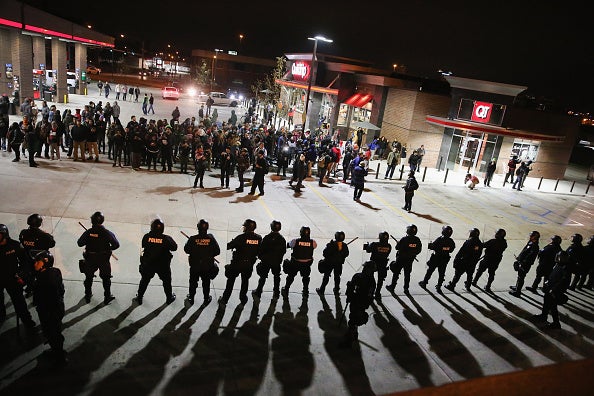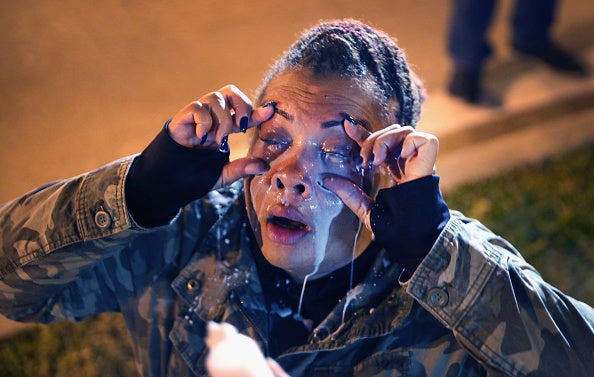This is hard to believe and even harder to see in print, but here it goes.
It’s been five years since a police officer killed Michael Brown Jr. on August 9, 2014; five whole years since the subsequent protests shut down a little town in Missouri called Ferguson.
There, I said it.
The actual contours of the protest as it shape-shifted into a full-blown uprising are still misunderstood ‘til this day. Folks know the basics. They know the name of the officer (Darren Wilson) who pulled the trigger; they know some of us organizers and organizations. And they know that Ferguson and its people, unrepentant and righteous, kicked off “the movement” as we know it.
But here’s the thing, most don’t know the deep toll the movement—the suppression and commodification of it—has taken on our lives or what we’re still up against right now.
To put it bluntly, people stopped giving a damn the second the QuikTrip stopped burning, before the ashes could even blow away in the wind.
There was once a time that I may have felt nostalgia—for the intense coming together of community, for the shared release of pent-up rage, for the cleansing tears that have since run dry even though the traces remain. Now, though, that nostalgia has just turned into depression and anxiety.

There is also the deep pain—hard and unflinching. This pain is only similar to seeing your child gravely injured and being powerless to stop it because it was unforeseeable, the force of it knocking the air from your own lungs.
And, then, there’s the disappointment.
We were in the streets, attempting to construct the narrative of us, to share our truths, to heal, protect, and build our Ferguson; while our so-called movement brothers, sisters, and allies were building their platforms on our backs and redirecting resources to their pockets.
We have been forced to watch the movement turn away from the masses of Black people activated by Mike’s death and become mainly focused on lucrative mainstream acceptance from white media and white funders.
With pure frustration, we saw our chants of empowerment and perseverance turned into cheap merch for rappers and entertainers who only wear it on their bodies but not in their hearts.
We figured out pretty fast that hashtags don’t move white supremacists, and petitions don’t change policy for Black lives, at least not where I’m from.
It is painful to watch a movement that you helped birthed be turned into the antithesis of why we turned up for a boy who none of us personally knew, but whom we connected so strongly with back then—and still do.
The clout chasers are all but gone now. Most have bolted for major liberally funded social justice cities or to white institutions to be on the other side of case studies. Gone with them are the resources and capital, both financial and social. And the media, both Black and mainstream, still go back to them over and over again even though they know that they haven’t lived, organized, or protested in Ferguson in years. The sheer laziness of some of these so-called journalists will equally be to blame when future generations are confused and lacking true historical knowledge about what really happened in and to Ferguson.
There will be a reckoning; I know this. But it’s still painful to watch a movement that you helped birthed be turned into the antithesis of why we turned up for a boy who none of us personally knew, but whom we connected so strongly with back then—and still do.
I would’ve liked tens of thousands of people to come here for the five-year anniversary of the rebellion. I would have liked to see a sea of Black folks turn up in the streets to commemorate the life of Michael Brown Jr. with those who knew him best. But that didn’t happen because that doesn’t pay. Some of us are still here, though—still struggling, still loving, still fighting, still imagining a world where Michael Brown Jr. wouldn’t need justice, because he wouldn’t have been shot to death and left on the pavement for hours in the first place.

Here, where there is the continuous repression of those of us who sacrificed it all in the name of freedom and justice, our lives will never be the same. Never. That’s to be expected, of course, but what most don’t understand is that the diluted movement on your televisions and timelines never really existed here in Ferguson. The word Ferguson in a panel discussion title or in a headline was a sure fire way to gain viewership, sure, but it was rarely from our perspective.
Our greatest strengths were a double-edged sword. We were revered for our tenacity and brashness, but also feared for it. Our ability to shut any and everything down made the vast majority of us a liability on university panels and television roundtables. They couldn’t predict what we would say, according to TV producers I spoke with behind the scenes on many occasions.
And what I really got from that was we might tell the world the whole truth about America, its ugliness, its violence, and its cowardice. Even now, though several of the Ferguson organizers have been shot and burned to death, they’re in their graves while some people who claim to love the people have been on MSNBC and haven’t even mentioned their names. Some of us have had to endure interrogation rooms, while they’ve been sipping tea in greenrooms.
I often ask myself was it all worth it? The weeks of barely seeing my loved ones. Being turned down by organizations for jobs and campaigns that are being funded through the direct organizing labor that we did here in Ferguson. I have watched members of my movement family be evicted from their apartments and shipped off to jail, and sometimes I don’t know what’s worse: opportunists eating and building with organizers in 2014 during the heart of the rebellion, only for them to get paid and not even return a phone call when we need them—or seeing the people you were in the streets protesting with being buried and jailed.

And you know what? The answer is yes. Always, yes. I’d do it all again for my people. I’d do it all again for Ferguson. I’d do it all again for Michael Brown, Jr.
*****
Tory Russell, is an activist, lead organizer of the Ferguson rebellion, political campaign strategist, and Mission Director of The International Black Freedom Alliance. Follow him at @VanguardTNT and his work at TheIBFA.org

